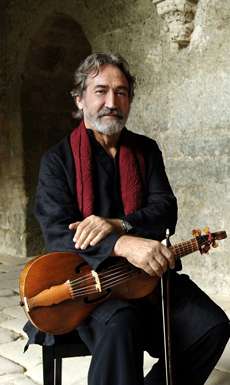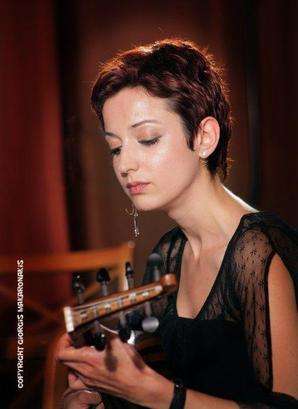|
Back
Ottomans, Byzantines and More New York
Alice Tully Hall, Lincoln Center
11/03/2013 -
“A Musical Exploration of the Balkans”: Music from the Kabbalah and Sephardic Israel, Bulgaria, Serbia, Greece, Byzantine and Ottoman Turkey, Moldovia, Romanies, Cyprus, Macedonia, Armenia, Bosnia
Hespèrion XXI: Jordi Savall (Vielle, Rebec and Music Director), Irini Derebai, Gűrsoy Dinçer, Lior Elmaleh, Marc Mauillon, Stoimenka Outchikova-Neduakjiva (Vocals), Nedyalko Nedyalkov (Kaval), Hakan Güngör (Qanun), Yurdal Tokcan (Oud), Haïg Sarikouyoumdjian (Duduk), Dmitri Psonis (Santur) and Morisca), David Mayoral (Percussion)

J. Savall (© David Ignaszewski)
”The music of the universe we encounter the moment we open our eyes...” (Jordi Savall)
Jordi Savall is the cynosure of that hallowed pantheon which includes Daniel Barenboim, Osvaldo Golijov, and Tan Dun. These are the artists celebrating the music of those congruous peoples whose politics, power grabs, religion and history have made them sworn enemies.
The Palestinians and Israelis (actually both Semitic), Sephardic Jews and Ottoman Turks (actually medieval partners), Han Chinese, Tibetans and Mongolians (Asiatic with identical histories) can be linked by music. Yet last night, Jordi Savall–the Catalan iconic musician who transcends countries, centuries and enmities–took on perhaps the most complex region of millennia-old hatreds last night in his “Musical Spirit of the Balkans.”
Unlike the political vehemence of other regions, the depth of these hatreds seems genetic. After Josip Tito forcefully put down these feuds, his death gave impetus to a resurrection of the same ethnic anger, with merciless recent wars. Mr. Savall, though, gave a program which concentrated on nearly all these Balkan peoples (save Albania), as well as Jews and Turks, both Byzantine and Ottoman.
That Turkish connection is clear. The word “Balkan” is Turkish for ”mountain”. But no mountain ever stopped either the Byzantines or Ottomans from invading, annexing, influencing and being influenced by each other. In fact, most of the music last night, outside of the ancient chants–Armenians, Jewish Byzantine chants–could well have come from any of these countries, only the languages separating them.
With any other leader, this might have been an evening of stamping, clapping and folk dances galore. But Mr. Savall, who I have long idolized for his Renaissance, Baroque and Near Eastern banquets, gave us a program which was ofttimes sombre, reflective, radiant with its inner voices.
Mr. Savall is as much a showman as a humanist musicologist, and he divided the evening into five philosophical categories. They were as poetic as his music. “Creation” included life and meeting. “Autumn” was family, work, maturing and celebrating. “Winter” was most expansive: “Experience, wisdom, sacrifice, spirituality, exile and death.”
And yes, “exile” was so important here, for the Balkan people are a people in exile from their own ethnic group through war, economics, and yes, “Balkanization.” The music was not entirely in sync with this, but so lovely were the selections that this didn’t matter.
The musicians were eclectic yet always together. The plethora of flutes, zithers, drums and Mr Savall’s vielle (a type of violin) were soft, rhythmic, even the percussion making more a series of throbs than actual drum sounds.
The songs were given by five soloists of interesting personalities. The three men sung and chanted Hebrew songs, Cypriot love songs, one ancient Byzantine chant (for this the stage was darkened) and Turkish numbers.
The two women couldn’t have been more different–or more entrancing. I wish I could run a picture of Stoimenka Outchikova-Neduakjiva, but nothing seems to be on the Net. A shame, for this Bulgarian lady, in a Bulgarian folk-dress, could actually croon her Bulgarian (or Turkish) music, or offer, at the end, what we think of as the unique Bulgarian trills.

I. Derebei (©www.songkick.com)
Her opposite was the Athens-born classically-trained Irina Derebi, appropriately Junoesque, exuberant in solos or in a magnificent duet in thirds with Ms. Outchikova-Neduakjiva.
She also played castanet at times, with my own memory of those lines by Wallace Stevens: ”Then with a noise like tambourines/Came the simpering Byzantines.”
It was a complete tapestry of musical similarities. The constant melismae, the sense of improvisation on even the simplest lines. (Béla Bartók was usually frustrated collecting Balkan folk tunes, since nobody would repeat a melodic line in identical fashion). And soft concord accompaniment, with little counterpoint except the percussion.
What I didn’t see in the program, and truly wanted, were the names of the translators, for the words were sometimes more beautiful than the songs. Yes, they have an Elizabethan lilt–”Fate has heard my complaints.: would it not light the candle of my hopes?” But this is natural, for the Elizabethan age was also the Golden Age of the Ottomans before their inevitable decline.
If the last section was a wee bit hokey, with the same popular Turkish song sung in Hebrew, Turkish, Serbian and Bosnian, it was still an homage to the marvelous Mr. Savall. He explained it once in the best way possible: “Music,” he said, “is the first language of humankind. Although we hear the voices of our parents at the moment we're born, we don't understand them, but we understand music, the lullabies. Music is also our ultimate language on a spiritual level>”
Last night, that spiritual level, that white light of the festival, was so resplendently achieved.
Harry Rolnick
|